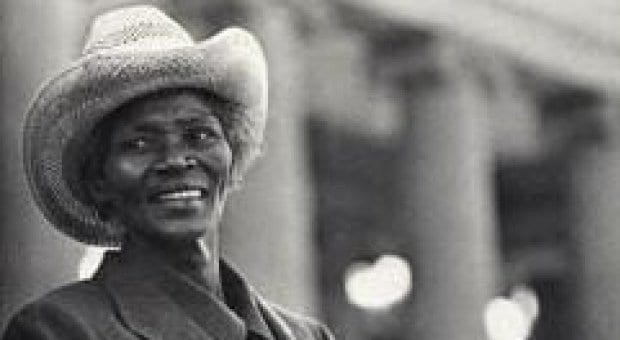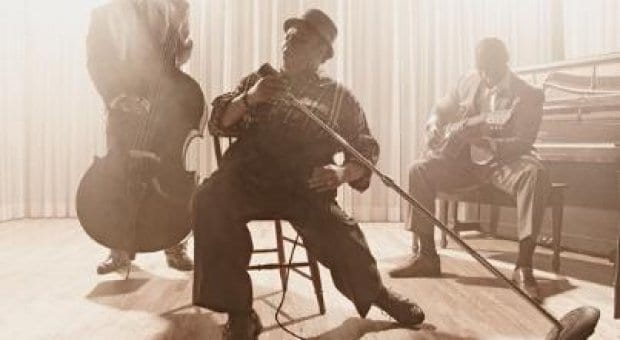
Credit: Courtesy of NAC
Thirty years ago my father took me to my first BB King concert, and halfway through his set at Montreal’s Place des Arts, King invited butch blues legend Willie Mae “Big Mama” Thornton onstage to belt out a song.
The hard-drinking Thornton – who would die seven months later, on July 25, 1984, at the age of 58 – was a regular headliner at legendary Montreal impresario Doudou Boicel’s Rising Sun Celebrity Jazz Club across the street. “Big Mama drank her gin with milk,” Boicel recalls.
When a frail Big Mama grabbed the mic at Place des Arts, she just about blew King off the stage.
“BB King came to my club after that show, and he gave me a hundred bucks and he gave Big Mama a hundred bucks and [blues legend] James Cotton was there and they played until four in the morning,” Boicel told me years later.
I bring up drag king icon Big Mama Thornton – she wore men’s suits and cowboy hats – because author, “female masculinity” advocate and University of SoCal professor Judith “Jack” Halberstam’s fascinating lecture “Queer Covers: Big Mama Thornton, Lesbians on Ecstasy and the Recycling of Political Culture” pinpoints how Elvis Presley ripped off Thornton’s song “Hound Dog” (credited to songwriters Jerry Leiber and Mike Stoller) and Thornton’s masculine stage presence, in the process redefining cool and morphing Presley into the king of rock ‘n’ roll.
“He takes the shout from Thornton, the defiance, the confident rejection of the ‘high-class poseur,’” Halberstam says. “Big Mama was a writer of ‘Hound Dog’ that made Elvis famous but never got money for it [except for a one-time payment of $500].”
That’s not all.
“While the history of Elvis has often been told as the history of cultural theft and in terms of the absorption of black cultural influence into white cultural production, only rarely is this process described in terms of the ‘straight’ absorption of ‘queer’ cultural influence,” Halberstam notes in her lecture.
Meanwhile, Stephen Barry (Montreal’s godfather of the blues) and his band backed up Thornton at the Rising Sun for three years. “For my money, she wasn’t lesbian because I remember these French girls would come up and try to kiss her and she’d get her elbow up,” he told me. “She wasn’t androgynous – she was like a shaman. She had a wonderful singing voice, a depth of feeling. It was the closest thing I ever had to a religious experience.”
But, Halberstam says, “Thornton, in her mode of dress, her affect, her phrasing and her bluesy performance, can easily be categorized as queer, and her effect upon Elvis, his masculinity, his way of dancing, his singing, has yet to be [properly] assessed.”
Thornton’s bisexuality is touched on in the acclaimed musical Big Mama! The Willie Mae Thornton Story, which stars Canada’s foremost singer of gospel, jazz and blues, Jackie Richardson, at the NAC Theatre beginning April 24.
“I believe [Thornton] was bisexual, and I play her very manly,” Richardson says. “I wear men’s clothes like she did. The thing about this musical that I’m really loving is that during this whole era when she came up and paid her dues, it was very hard for women. She did what she had to to get by in that man’s world, and she could cuss you out like nobody else. That’s how she survived. She also made it very clear that while she had some love for men, it was the women in her life she knew had her back.”
As Halberstam says, “Big Mama Thornton is one of the unsung heroes of both rock and blues. She exemplified how people deal with masculinity in female performers: the term ‘Big Mama’ was used to domesticate Thornton and turn her masculinity into something female again.”
Meanwhile, over at the now-closed legendary Rising Sun, Thornton headlined many gigs until her final days. She remained bitter to the end about how she and Johnny Otis were never properly credited for Hound Dog. “I’ve been singing before Elvis was even born,” she once famously quipped. “He makes a million and all this jive because his face is different from mine.”
Years later, when I told BB King that his 1983 Montreal concert with Big Mama was my first blues concert, I also asked him about Elvis and their days working for Sam Phillips at Sun Records in Memphis.
“I liked Elvis because he called me ‘Sir,’” King replied.
That kind of respect eluded Thornton in life, though when Janis Joplin first heard Big Mama sing what would become Joplin’s signature song, “Ball and Chain,” Joplin went backstage to ask permission to sing it.
A decade later, in 1977, on the Sassy Mama album (on Montreal’s Just a Memory Records), you can hear Big Mama sing “Ball and Chain” in a live set recorded at the Rising Sun. You can hear her tell her band to do the song “BB King-style,” then hear her a minute later chastise her guitarist Phil Guy (the late brother of Buddy Guy) for soloing too long.
Thornton may not have gotten her due in life, but no one messed with Big Mama onstage.
Big Mama! The Willie Mae Thornton Story
Starring Jackie Richardson
Wed, April 24–Sat, May 11
NAC Theatre
53 Elgin St


 Why you can trust Xtra
Why you can trust Xtra


